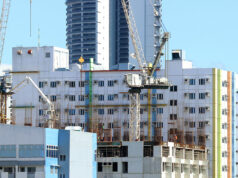This is my 10th weekly column written in “quarantine.” And in that period, Metro Manila has dealt with the COVID-19 pandemic by going through varying degrees of lockdown. The “stay at home” protocol has disrupted many if not most aspects of people’s daily lives. By next week, however, there may be changes to the situation in and of the National Capital Region.
The Philippine Star has reported that all 17 mayors of Metro Manila were recommending the shift to general community quarantine (GCQ) starting June 1, from the stricter modified enhanced community quarantine (MECQ) that started May 16. Under GCQ, however, mayors may still impose localized lockdowns in barangays or areas with many cases of COVID-19.
Reacting to the mayors’ recommendation, Palace spokesperson Harry Roque was quoted as saying that this should be reviewed in relation to COVID-19 cases’ “doubling rate” and “critical care capacity”; the need to “pay attention to our economy”; and, “our ability to adapt to a new lifestyle.” The President is expected to decide on the matter by this weekend.
 Since May 16, Metro Manila, Laguna, Bataan, Bulacan, Nueva Ecija, Pampanga, Zambales, and Angeles City have been under MECQ from ECQ. Only Cebu City and Mandaue City on Cebu island in the Visayas remain under ECQ, while the rest of the country is already under GCQ. For the National Capital Region, the main difference since MECQ last May 16 was that more businesses were allowed to operate partially, but mass transportation was still prohibited. Some public transportation may resume only after we transition to GCQ or its modified version.
Since May 16, Metro Manila, Laguna, Bataan, Bulacan, Nueva Ecija, Pampanga, Zambales, and Angeles City have been under MECQ from ECQ. Only Cebu City and Mandaue City on Cebu island in the Visayas remain under ECQ, while the rest of the country is already under GCQ. For the National Capital Region, the main difference since MECQ last May 16 was that more businesses were allowed to operate partially, but mass transportation was still prohibited. Some public transportation may resume only after we transition to GCQ or its modified version.
Allowing more businesses to reopen since May 16 is a welcome relief particularly to many who have lost their sources of income during the quarantine period. It is a needed boost to the economy as well. However, relaxing restrictions appears to have its price, as COVID-19 cases in Metro Manila are seemingly on an uptrend once more. A more comprehensive study of data from May 16 onwards will indicate if this is, indeed, the case.
On my part, even if we transition to GCQ or modified GCQ by next week, I am not exactly raring to go out. I am not sure how many other Metro Manila residents feel the same way since not everybody has the opportunity or the capacity to work from home, or to stay at home longer than mandated. It all depends, I guess, on whether necessity can overcome people’s fear of getting sick.
I hate to admit this, but COVID-19 has made me paranoid. In fact, in the last 10 to 11 weeks, I have been out only a few times since I am the designated “market” person in our home. And after every trip, I go back anxious and worried if I have brought the virus home with me. Everything from “outside” goes through a tedious process of washing and disinfecting, including me. The same goes for my wife every time she comes back from the occasional trip to the office.
There is nothing “normal” about this “new normal,” but I am sure many other homes have adopted extraordinary “protocols” at the household level if only to give themselves some degree of assurance that they are sufficiently protecting themselves from COVID-19. While I am certain that we can get used to this new lifestyle, I am sure the present situation has been particularly hard for our seniors, our minors, and those requiring regular medical care.
We can do away with haircuts and leisure activities for the meantime. A trip to the mall is not necessary, at least, for me. But my family has been in need of a visit to the dentist. And while income taxes have all been settled, car insurance and registration are due, as well as periodic maintenance. Some home repairs and other services are likewise needed, but have had to be put off. I have managed to temporarily remedy some minor plumbing and electrical issues.
But while I welcome the possibility of transitioning to GCQ, primarily to allow people access to more goods and services, without public transportation, service people may not be available still. More important, if service people have access to transportation, their mobility might make them high-risk individuals. In this line, will I be ready to welcome these “outsiders” in my home to provide me some service?
As any homeowner knows, things break down at home all the time. From a busted fuse to a leaking roof or a broken window. And while some issues can be handled with DIY fixes, major problems like a broken air-conditioner require “professional” help. Moving forward, what will be the “protocol” when it comes to having service people come around?
Should I be ready with a thermal scanner and a disinfecting booth for them at the front door? Should I be taking down personal information and other particulars for possible contact tracing in the future? If service people come from utilities and service companies, should they present “certification” from their companies with respect to their fitness to work and the required form indicating that they are adhering to required work standards?
Businesses and offices that are reopening are required to follow specific standards or guidelines for employees returning to work. But similar protocols are not in place for service people in household situations, other than requiring a “face mask” and “physical distancing.” How are homeowners to go about these things, then?
Car repairs are obviously different in the sense that one can actually leave the car at the shop. The same for those needing appliance repair. But what about home repairs like plumbing and electrical work? The homeowner cannot exactly leave the home while the workers undertake repairs. To begin with, the homeowner is covered by the “stay-at-home” protocol. Physical distancing is practically impossible especially in small homes.
It is easy enough to reason that common sense should prevail in such situations. But, the fact of the matter is, COVID-19 is such a game changer for everybody. There are no ready-made playbooks for it. So, there is no telling if we are dealing with it correctly or not. And the pandemic has obviously made people more anxious and worried than ever before. In this line, for me, transitioning to GCQ from MECQ is both a welcome development and a source of major concern. But, we do have to move on. So, I guess we just have to take things one day at a time.
Marvin Tort is a former managing editor of BusinessWorld, and a former chairman of the Philippines Press Council.



